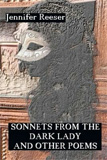Review by Jenn Ruckel

Saint James Infirmary Books
ISBN-13 978-0615589503
2012, 148 pp., $13.48
www.amazon.com
Compelling and metrically confident, Jennifer Reeser’s third book is a compilation of twenty-seven poems written from the perspective of the Dark Lady to whom Shakespeare addresses sonnets 127–152. The rest of the book–seventy poems in all–touches on a variety of subjects, from translations of Baudelaire to lyrical love poems and even poems to the author’s cat, with Reeser’s poems on New Orleans’ French Quarter especially memorable. The winner of Word Press’s first book prize and a widely published poet in formalist circles, Reeser offers surprising language and an often playful tone in this accessible, engaging collection.
Following an epigraph from Heraclitus, “Blind Concessions” presents a striking portrait of the Sibyl. Although working now at a pastry stand, she still sees much, despite her blindness, and the poem explores the extent of this sensitive perception: “[A]s motions go, / hers have the kind of clarity the seeing / could envy: that excess, that overflow / inherent in the bearing born of being.” This Sibyl does not need ordinary vision to function in the world or to perceive what lies beyond it. Here, too, Reeser demonstrates her talent for vivid, fresh description, her ability to condense an image to its essentials within meter and rhyme’s constraints: “Sightless Sibyl at the pastry stand / wears white, and with a checkered terry towel / wipes down the counter with one wrinkled hand.” A few lines are all Reeser needs to provide insight into a character or moment.
Elsewhere, Reeser draws from literary forebears. In “because the cut your presence,” for example, Reeser adopts the typography and techniques of e.e. cummings, experimenting with form and unconventional syntax. From her first two lines–“because the cut your presence is to ache / to ache {oh no one else no no one none}”–Reeser uses punctuation and repetition to create a forceful rhythm that pushes the poem forward. Much more than a formal experiment, the poem traces how hearts may break so beautifully–how pain and love overlap in many relationships. Through wit and honesty, Reeser achieves insight into human experience and emotional ambivalence.
Of course, the collection’s title makes Reeser’s “Dark Lady” sequence the central focus of the book. In these poems, the poet uses archaic language in a way that reflects reverence for the original text of Shakespeare’s sonnets, while introducing new life and a new intensity to an established style. Her sonnets in the persona of the Dark Lady offer a direct response to Shakespeare, utilizing the same techniques Shakespeare himself was famous for–his wit and ability to distill complex thinking into just a few words–but with a female perspective. In the neat quatrains of her reply to “My mistress’ eyes are nothing like the sun,” Reeser observes, “No braggart sagas follow his devotions; / His myths are masked, reported visions few,” thus providing the lover’s view of the man who courted her. The Dark Lady observes further:
Many a diva gets her burning word,
Chocolate oblations brandied, blessed, hot-toddied.
I have for heat the hidden and unheard,
An incandescent, backwards disembodied,
And would — for naught and nothing — make a trade
For pageants staged within him, well-displayed.
Here, Reeser imagines the Dark Lady’s response to what Shakespeare was writing about her. She does not want the “pageants staged within him,” as Shakespeare himself did not want anything other than the Dark Lady’s true self in his original; yet she also acknowledges the power of what is not seen: herself, the lady literally in darkness, and those passions that she conceals (except in private) but which remain “incandescent.” In this sequence, and in the rest of her extensive, wide-ranging collection, Reeser ably demonstrates why she is one of the most admired of today’s younger poets writing in rhyme and meter.